#The way she treats hermione in GoF makes me uncomfortable
Explore tagged Tumblr posts
Text
Honestly, the way that the Weasley's treat Fleur is especially gross when you realize she's an 18 year old girl dating a man in his mid twenties. Like, how do you see your son/brother bring home a girl (who was probably just 17 when they started dating. Yes, I know the age of consent for wizards is 17 but come on lmao) who still has "teen" attached to her age and attack the girl without saying a single thing about the literal grown ass man 💀
#If I had a brother almost a decade older than me and he brought home a girl who basically went to school with me#I'd be so grossed out#Jkr loves her fucking age gaps#There are definitely problematic things in these books#Honestly the way molly is willing to be antagonistic towards literal children is insane#I'm not talking even just talking about fleur#The way she treats hermione in GoF makes me uncomfortable#How are you going to be cold towards a fifteen year old girl like that#It's so immature
22 notes
·
View notes
Text
Harry And Personal Conflict: A Meta On Evolving Dynamic With Ron and Hermione
One of my last metas on Harry was how his abuse at the Dursleys informed who he is as a person and a lot of his main personality traits. This time, I want to explore Harry's relationship with conflict, mostly in regard to his best friends - Ron and Hermione.
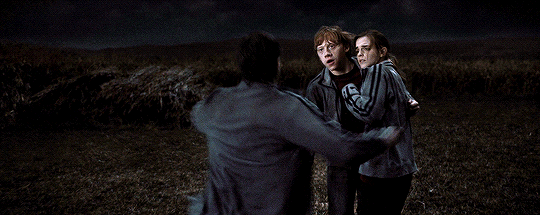
First things first, because of his abusive upbringing where he is constantly in conflict with his caregivers, conflict is seen as Bad Thing when we first meet him as a 11 year old. And it informs how he reacts to both Ron and Hermione at first. He instantly relates to Ron because Ron is an underdog - a boy who feels neglected and passed over in his large and boisterous family. Harry shares his own experience of neglect with Ron and they both bond instantly.
His initial impression of Hermione is that she has a "bossy sort of voice" . The bossiness is an important characterstic to his impression of her - she reminds him of an authority figure and he does not particularly take to her as easily as he does Ron. Before the troll incident, he is frequently annoyed by her interventions because "he can't believe anyone would be so interfering". It's her vulnerability and the fact that she may be in danger that makes Harry, and by extension Ron, go after her. And she pays it back in full with a demonstration of loyalty to them in front of people she wants to impress: teachers. This sets the tone of his friendship with Ron and Hermione.
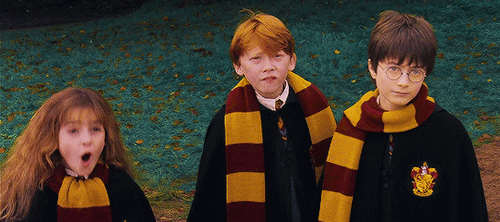
There is sense of easiness to his friendship with Ron, especially in earlier books that he doesn't quite share with Hermione. This is a bit gendered as well, of course. His relationship with Hermione evolves as Ron's own equation with two of them changes, more specifically Ron's cognisance of his romantic feelings for Hermione. So how does this inform his relationship with personal conflict?
Let's look at it Book wise.
Book 1-4: Since Harry tends to see All Conflict As Bad, when Hermione becomes his friend, he tends to ignore traits of her that he particularly doesn't take to. Specifically her argumentativeness - which he usually leaves Ron to deal with. For example, look at when Hermione drags him off to the kitchens in GOF. When he realises what this is about, he nudges Ron, and Ron does the protesting: "Hermione, you are trying to rope us into that spew stuff again!".
Often, you can say he is amused by Ron's more ..let's say colourful.. reactions to Hermione being overbearing. So when Ron and him are not speaking and Hermione gets a Quidditch term wrong, it causes him "a pang to imagine Ron's expression of he could have heard Hermione talking about Wonky Faints". It's that deeply ingrained into the dynamic.
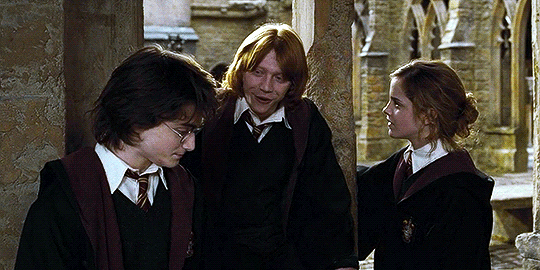
While Ron acts buffer and protects Harry from stepping into a potential conflict ("skip the lecture", "don't nag" he tells her), Harry's world view remains quite the same. Part of Harry's growing up is integrating conflicting points of view and gaining nuance. For example, he can't understand why someone like Snape, who seems to hate him so much, can also save his life at the end of Philosopher's Stone. This is his first venture into trying to integrate two conflicting things about a person into nuance. Dumbledore gives him a very easily digestible story, one that appeals to his ideal of his father and Harry is sated.
Again, Harry's world view is tested when he finds out that he relates with Tom Riddle - for their "strange likenesses". He doth protest too much at Dumbledore's office: "I don't think I am like him! I am Gryffindor!". And Dumbledore offers him a wisdom nugget: "It's our choices which define who we are" (paraphrasing). Harry is uncomfortable that he empathises with Tom Riddle, his parents' murderer, at this point in the story.
In the first four books, his only proper personal conflict has been with Ron.
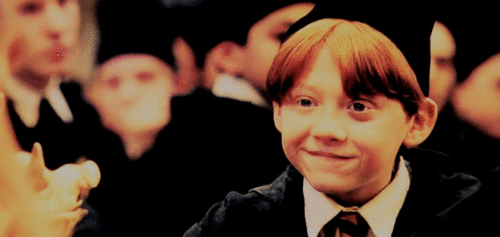
It is depressing to think about in these terms - but Ron is Harry's first experience of unconditional love (we can even put Hagrid here, but he is not the one who spends most time with Harry). And when Ron and him fight, Harry is so hurt by the prospect that he proceeds to abandon Ron before Ron abandons him. (the whole chucking a "Potter stinks" badge at him and making a jab about having a scar is what he wants, or the fight in DH where he yells "then leave! Pretend you have gotten over your spattergoit and have your mummy feed you up"). It's an interesting defense mechanism and he feels "corrosive hatred" towards Ron during these times because Ron and him aren't supposed to be like this. Ron is a certainty in his life. It's also why when Ron comes back, Harry either doesn't need him to apologise (as in GOF) or quickly forgives him in DH - although I do think Harry thinks the locket bit was punishment enough. But even without the whole locket, I think Harry has trouble holding Ron accountable in general beyond few slaps on the wrist - especially if Ron and he are on good terms.
5th Book: This is the transition point for Golden Trio friendship. Harry has come back from an immensely traumatising night at the graveyard and his PTSD isolates him from his best friends. This is also the point where Ron, especially after GOF, is aware of his romantic feelings for Hermione ("the perfume is unusual Ron", Hermione tells him in this book). So in this book, we often see Ron and Hermione on one side, with Harry on the other.
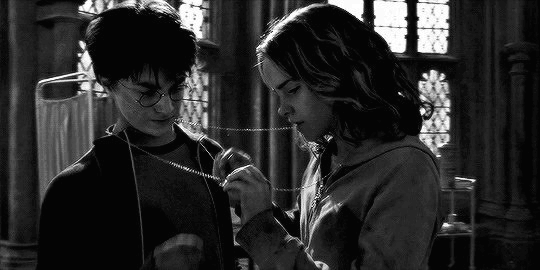
Ron is unwilling (quite like Harry in that respect) to engage him in a direct conflict, but he is also unwilling to shield him from Hermione's nagging in this book. This is why, OOTP is the book where you see Harry ignore or avoid Hermione and lie to her more than usual to avoid conflict. For example, he tells her that Snape thinks he can carry on Occlumency once he got the basics - that is categorically not what happened. Or the entire day he spends ignoring Hermione's warnings about breaking into Umbridge's office. (The description here is comical - about Hermione vehemently hissing so much that Seamus Finnigan is checking his cauldron for leaks. ) If he cannot lie to her or avoid her, at the end of the rope, he will treat her to display of his frightening temper.
Interestingly, OOTP is also the book that his world view goes through a tremendous upheaval: mainly, his ideal of his father and having empathy for Snape. It is unnerving for Harry to see Snape being the "boy who cried in the corner" when his father shouts at a cowering woman. Similarly unnerving is that his intense empathy for him - "he knew exactly what Snape felt when his father taunted him and judging by what he had seen, his father was every bit as arrogant as Snape always told him".
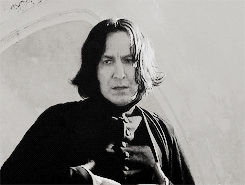
While he is placated that his father grew out of it, this memory of his father being a bully is something he cannot bear to watch again in DH. Few chapters later, he grins at Ron "sweeping his hair" back to make it look more windswept, just like his father - suggesting that Harry is beginning to integrate two conflicting things he knew about his father: from the people who loved him vs the people he was cruel to.
6th Book onwards: It's interesting to me that his better appreciation for Hermione comes after OOTP (one, because she is the one who challenged the whole Ministry plan and she followed him into a trap knowing it was one anyway) but also the timing of it is in line with Harry having a more nuanced understanding of his father. He struggled to hold conflicting information about him into one cohesive person - the boy who was a bully vs the man who joins Order of Phoenix to fight a war he could very well have sat out. The pedestal crashing helped Harry gain nuance (he thinks of his father and mother with pride in HBP - of them walking into an arena with head held high). HBP also sets up his deeper understanding with Snape in DH. There is lovely meta by about this by thedreamersmusing. Read it here. HBP is also the book he feels "sorry" for Voldemort and also feels "reluctant admiration" for him - both of things he is less defensive about.
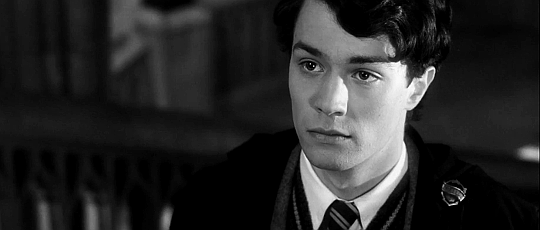
And this nuance informs his relationship with conflicts - especially the kind he has with Hermione. He is more confrontational with her and does not lie or sneak around her as much as he did in OOTP in the Half Blood Prince. ("Finished? Or do you want to see if it does back flips?" He asks her when she takes the book from him to check if it's jinxed. Or the "I hope you enjoy yourself" he calls out irritably when she declares intention to find out who HBP is. And "do you want to rub it in Hermione? How do you think I feel now?" He tells her when she says she was right about HBP).
The fact that he is willing to be confrontational with her is a big step in his character - a step up from his unregulated outbursts in OOTP, which is a function of him not knowing how to put his anger across in normal ways. He is also more willing to stand up for her in front of Ron too - "You could say sorry" he tells Ron bluntly. This is in contrast to his more quiet standing up for her in POA: "Can't you give her a break?" Harry asked him quietly. In POA, he lets the subject drop after Ron flatly refuses. Here, he presses on more : "What did you have to imitate her for?" "She laughed at moustache!" "So did I, it's the stupidest thing I have ever seen".
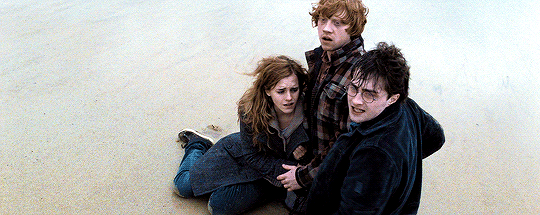
His relationship with Ron is an interesting contrast to his relationship with Hermione, which functionally teaches a very important lesson for an abused child who thought all conflicts are bad: That his friendship with her is challenging, and frustrating, filled with conflicts but their love for each other isn't disputed. It's a very important thing for brain development in general - to hold conflicting information in one space. The defense mechanism abused children do to avoid this is called splitting.
So, Ron allows Harry to be the age he is: a teenager and it's foundation for his further development, and Hermione teaches him how to be an adult, and therefore, spurs his growth. (In esoteric terms, if you look at Ron and Hermione as proxy parents - Ron is the Mother archetype, the one who offers unconditional love. Hermione is the Father archetype - one who demands best of him, and guides him).
Additional reading: Harry, Prongs and Prince - Harry's Inner Struggles For Forging An Identity. By u/metametatron4
Harry Identifies, and Reluctantly Admires Snape Even Before The Prince's Tale by thedreamersmusing
#harry james potter#hp meta#harry potter character analysis#hp character analysis#golden trio#golden trio analysis#harry x ron x hermione#harry and ron#harry and hermione#ron x Hermione#severus snape#james Potter#harry potter#tom riddle#albus percival wulfric brian dumbledore#albus dumbledore#metas#harry potter and order of phoenix#harry Potter and half blood Prince
649 notes
·
View notes
Note
I think its just me being a bit thick, but what examples are there of the hp girls being a Mary Sue? (I realize this makes me sound defensive but I'm not, I'm just genuinely intrigued)
Not being Mary-Sue per-say (that’s a rather iffy area, and I apologise for using the term so lightly), but more in the vein of ‘they do bad things which are never called out on in the narrative and they never deal with the consequences of said-bad things’.
These are a few that I can think of from off the top of my head (apologises if I get the details wrong);
Hermione setting the flock of birds of Ron. She never deals with the consequences of this (she doesn’t even show remorse for this until Ron almost dies from being poisoned), and, within the narrative, it is later treated as a joke (when Hermione mentions ‘not ruling out’ setting more birds on Ron when he returns in DH, it’s framed as a cutesy moment as opposed to anything else). Despite the fact that it was physical violence, Hermione is never called out on this by the narrative or by any other character. To make matters worse, she shows no real remorse for her actions until Ron almost dies (the day after she attacked him, Hermione laughs at Ron during a lesson- during which, by the way, his face, hands and arms were still covered with cuts from the birds.
Ginny virgin-shaming Ron in HBP. Ron was right to be called out on basically slut-shaming Ginny. I’m making no bones about this; Ginny was right to call him out on it. However, Ginny then goes above-and-beyond what was required to call Ron out, humiliating him in front of Harry, and then exposing Hermione’s secret (kissing Viktor Krum in GOF) to Ron despite knowing that Ron loved Hermione and how much of a sore spot Krum was to Ron. Ginny then calls Ron a hypocrite when he actually takes her advice to ‘get some snogging done’. Ginny is never called out on either of these things, despite how instrumental she was in the Lavender fiasco. Wouldn’t Hermione have gotten angry at her for exposing her secret?
Ginny taking pot-shots at Ron’s apparent lack of masculinity. The ‘Pygmy Puff tattoo’ makes it clear that Ron is apparently far less masculine than Harry (despite the fact that Ginny knew how badly Ron’s insecurities about being lesser than Harry were). She also does this in the presence of Hermione (who ends up rolling around on the carpet in fits of laughter. Ron already had intense insecurities about being ‘lesser’ than Harry, especially in the eyes of Hermione. Ginny knew that, and still taunted him. It just comes across as borderline-bullying rather than sibling mockery.
These are just the ones that I can remember, but you get the point. It’s not so much a ‘Mary-Sue’ situation, but more a ‘the narrative never presents these acts of bad behaviour as something negative’ situation. I’ve seen these three examples on list of ‘Badass things Hermione did’ and (to a lesser extent) ‘Badass things Ginny did’. Which leaves a profoundly bad taste in my mouth, considering the implications of said-actions.
Funnily, enough, they only seem to happen in HBP (and, to a lesser extent, DH), and are all targeted towards Ron.
I personally think that JK Rowling has a problematic way of writing powerful female characters. She’s tries to write them as strong, but they often come across as cruel instead. Which I wouldn’t mind too much, if the narrative actually called them out on their actions. But it doesn’t; JK Rowling frames this incidents as ‘badass’ and to applauded, despite how damaging that idea is.
That’s why I quite like the way JK Rowling wrote Luna. I think, because she was in the foreground a little less, Luna was able to be an amazing character without Rowling forcing the narrative to declare her so.
Hopefully that answered your question, anon. I apologise if it seemed like I was ranting, but this aspect of Rowling’s writing really makes me uncomfortable.
Obviously, this is just my own personal opinion, and you’re free to disagree with me. I know most people don’t see it in quite the same way.
10 notes
·
View notes